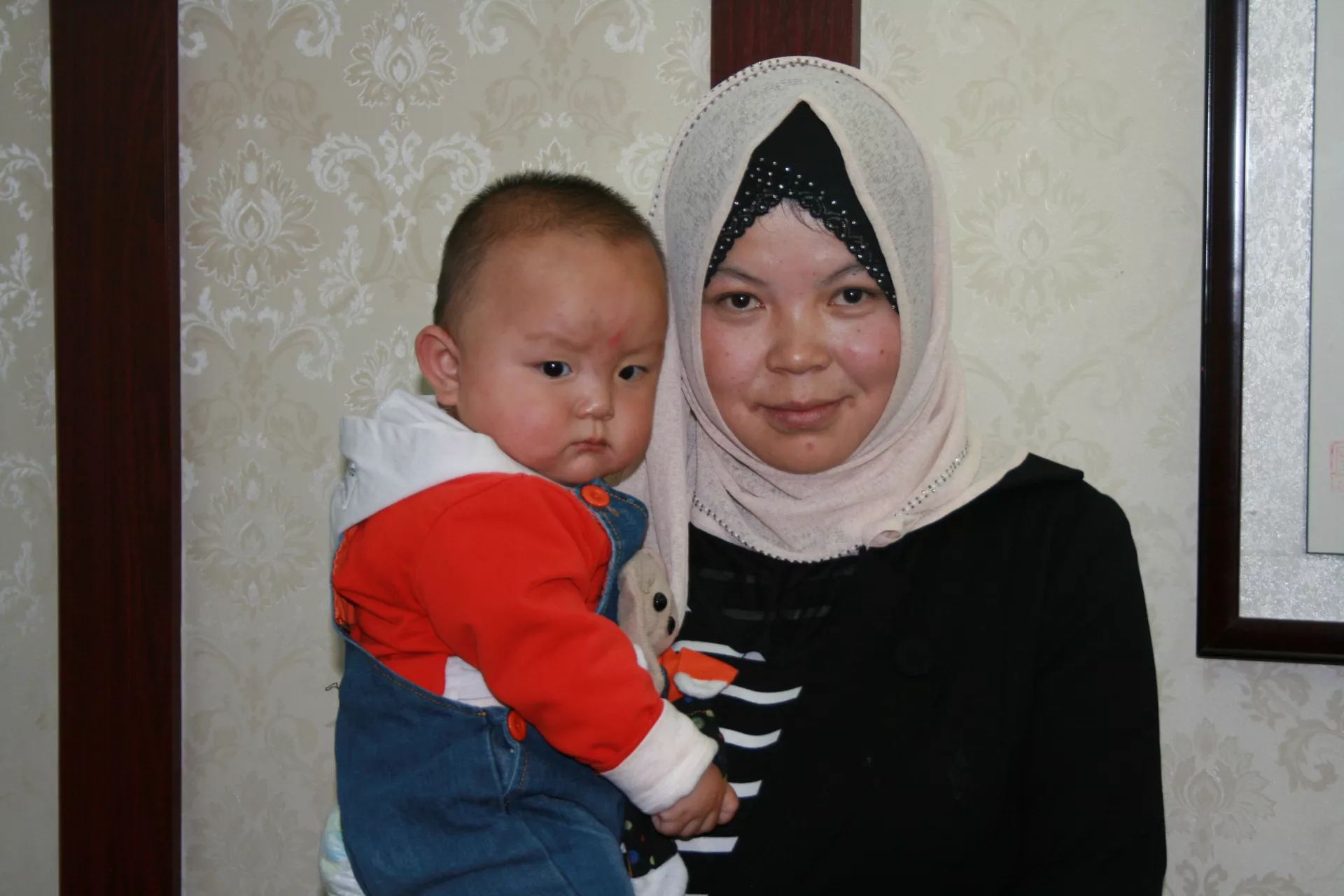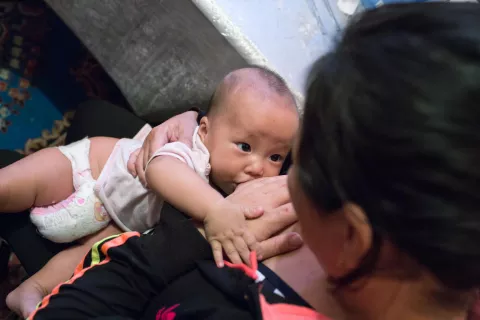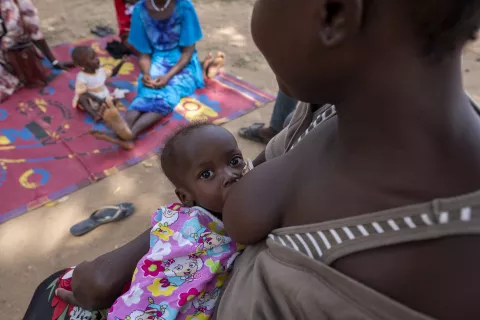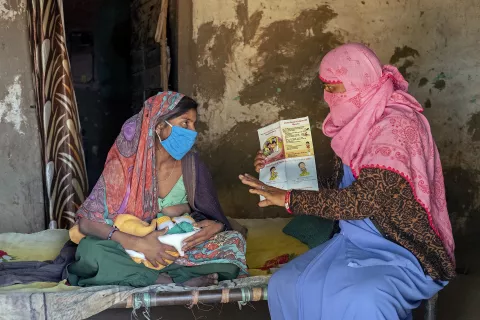New breastfeeding practices bring fresh hope
Story

Datong County, Qinghai Province: December 2017 is a special month for 24-year-old Ma Guiting – it's the month her second child, Yaxuan, was born. Her daughter is now one year and half.
“[My daughter] has been getting the best care since she was born, because now I know so much about breastfeeding,” says the mother of two with a broad smile. As the youngest of two daughters, Ma Guiting lives at home with her parents in Gangoumen village, as is traditional in this area, together with her husband and their two children.
Unfortunately, Ma Guiting didn't have such a positive experience when her first child, a son named Yajun, was born in November 2016. “I kept trying to breastfeed him because he was crying, but it was no good. I just didn't have enough milk,” she says. “I felt completely helpless, tears streaming down my face as he cried louder and louder. It was then that my mother gave him two teaspoons of a warm sugary solution, which stopped him crying,” she says. This homemade solution, which in Ma Guiting's village is traditionally made from water and brown sugar, is given to newborn babies to supplement or replace breastmilk. On the second day, the solution was replaced by warm glucose water, which her grandmother had prepared.
The following day, Ma Guiting and her son were discharged and returned to their village, where they received a warm welcome. But things still didn't go smoothly. “Just when the baby was getting used to the glucose solution, we switched him to formula, which cost us about RMB1,000 every month,” she explains. This was an additional financial burden on the already struggling family, especially as Ma Guiting's husband was out of work. After four months, they switched again, this time to boiled fresh milk, a common substitute, in Ma Guiting's village. Luckily, they didn't have to buy the milk, since the family has a cow which they milk every morning.
Things didn't go well. “The baby didn't like fresh milk at first and used to spit it out or vomit and then he'd cry. It was really upsetting for me because I knew he needed my breastmilk, but unfortunately, I just didn't have enough. In the end, the baby did reluctantly take it and even got used to it, because there was no other alternative.” After four months, little Yajun was introduced to a new type of food, 'congee', a local porridge made from rice. This was in addition to the solid food cooked by the family and chewed by an adult before being fed to the baby.
When Ma Guiting became pregnant with her second child, things took a much more positive turn from the start. “When I visited the hospital for my pre-natal check-ups, I immediately noticed a change in the attitude of hospital staff, who were very welcoming and helpful. They passed on information and advice about why it was important for me to breastfeed my baby. This continued every time I went to the hospital for my check-ups, right up to the delivery day. They also gave me several pamphlets with more information on breastfeeding, which I found very useful and easy to understand,” she adds.
This may have been because Ma Guiting's second pregnancy coincided with the roll-out of a breastfeeding promotion project by the National Institute of Health Education and Qinghai Provincial Health Commission, in partnership with UNICEF China. Through the project, hospital township and village doctors and midwives are trained to promote breastfeeding and good breastfeeding practices to pregnant and nursing mothers like Ma Guiting.
When Ma Guiting gave birth to her second child, everything about her experience, both in the hospital and at home, was different, which is why December 2017 holds such special memories for her.
“The skin-to-skin first contact with my baby, as well as knowing the correct breastfeeding position and to feed her longer, made me feel so proud and like a real mother. It also helped me produce a lot of milk, following advice from hospital doctors and midwives. As usual, my mother tried to feed my baby with sugary water, but I didn't give her the chance as I now know how important it was for my baby not to have any additional food apart from breastmilk,” says the newly confident mother as the baby sleeps soundly on her lap.
Unfortunately, Ma Guiting's family was very offended. Her mother felt that she was being disobeyed, and the rest of the family, including her husband, were unhappy that Ma Guiting was not observing traditional customs on how babies are supposed to be treated and fed. Her mother resented her daughter's behaviour so much that she even initially refused to help take care of her new granddaughter. But Ma Guiting was undeterred and tried to convince her mother, sharing with her the information she'd been given at the hospital. Doctors who came by to check on the new baby also gave her hope, encouraging her not to give her baby any other food apart from breastmilk, and reminding her of the benefits for both mother and baby.
After three days, Ma Guiting and her daughter were discharged and welcomed home enthusiastically by their family and neighbours, with singing and dancing, messages of congratulations and presents for the new baby. As usual, her mother made up a bottle of formula, suggesting Ma Guiting give it to the baby to supplement her breastmilk, which many people in their village believe isn't enough to fully satisfy a baby.
“Just as we were celebrating the birth of my baby, I saw my mother preparing a bottle of formula. Despite the pain I still felt from the caesarean section, I immediately stood up and begged her not to feed my baby with formula, and she reluctantly agreed. I reiterated the fact that no additional food is supposed to be given, as breastmilk is enough for the baby in terms of both quantity and quality,” recounts Ma Guiting, on the verge of tears. This immediately reignited the tensions that had started at the hospital, and this time her neighbours joined in, rebuking her for being disobedient.
As each day passed, the tension escalated, but fortunately the family received the first of a series of weekly home visits from Ma Yuhua, a local village doctor. Ma Yuhua is one of the Gangoumen village doctors trained in Datong County, as part of the pilot project to promote breastfeeding. In addition to counselling aggrieved family members, the village doctor reiterated the pro-breastfeeding messages that Ma Guiting had constantly shared, and gave the family three mother and baby booklets which had additional information on breastfeeding. This helped Ma Guiting's mother and husband, in particular, to fully appreciate the benefits of breastfeeding.
“Had it not been for my resilience, the counselling sessions and the materials that the village doctor shared with my family, the family conflicts would have escalated. But right now, we're all living in harmony and I'm getting all the support and care I need for my baby from my mother and other family members. They make sure I get nutritious food – despite our financial difficulties – so that I always have enough breastmilk for my baby, as this is her only food.”
Ma Guiting continued to breastfeed her baby daughter, without any additional food, up to the end of June 2018, when the baby was six months old, following advice she'd received from the hospital and village doctors.
“I'm so proud of my baby! She's very healthy, as you can see from her weight and smooth, plump skin. Compared to my first child, she hasn't suffered from frequent colds and I believe she's more intelligent as she's a very fast learner. As for me, I'm no longer overweight as I've lost about 15 kilograms since I started breastfeeding, and this makes me feel proud and confident when I'm with other women of my age. I no longer have to go through the stress and additional burden of buying formula and bottles and carrying them around. In fact, breastfeeding is really convenient.”
Ma Guiting and her mother are now spreading information on good breastfeeding practices to their family, friends, neighbours and others in their community at every opportunity.
“Given the chance to have another child, I will definitely do things differently as I'm now even more knowledgeable and experienced,” says Ma Guiting smiling, as she flips through the mother and baby booklets that the village doctor gave her.
UNICEF China partners with the National Institute of Health Education and the National Health Commission to transform the lives of thousands of mothers and children across China, such as Ma Guiting and her daughter Yaxuan, by improving breastfeeding practices among parents and caregivers of children under two years old. The project includes interventions at the individual, household and community level to bring about a change in behaviour and an increase in demand for quality services, through awareness raising and equipping mothers and caregivers with the relevant knowledge and skills around recommended breastfeeding practices. It also focuses on building the capacity of government partners such as the National Institute of Health Education and provincial health commissions.




